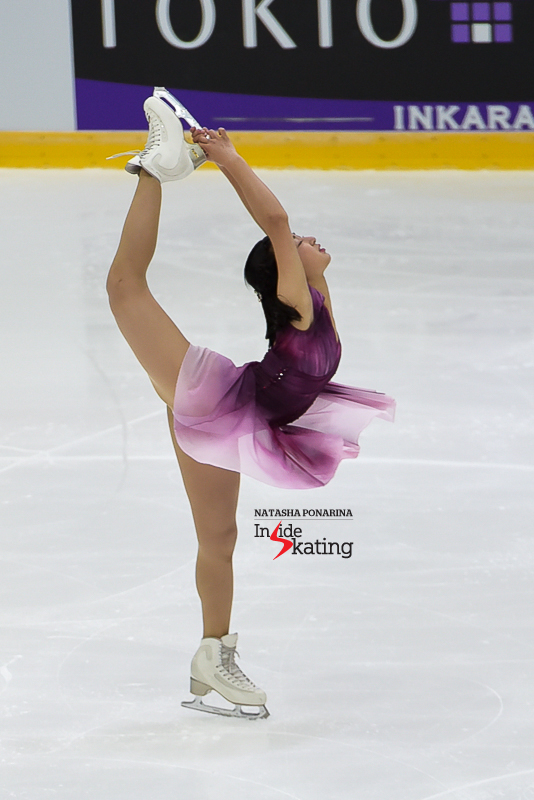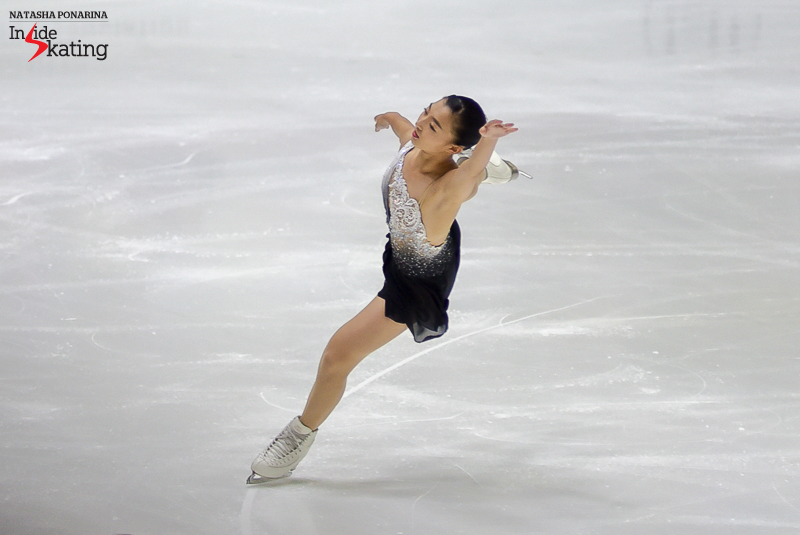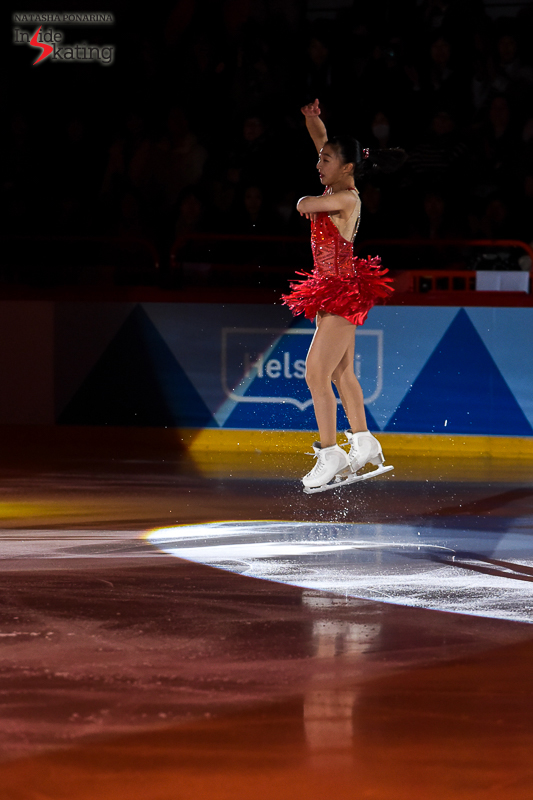
When you hear the name “Kaori Sakamoto”, what would come to your mind first?
Her huge jumps? Her incredible speed across the ice? Her wonderful feel for the music? Or her joyful face after delivering a good performance?
Over the past seasons, Kaori has won the hearts of skating community with her dynamic skating style and bubbly personality; but, backstage, the teenager also shared with us the difficult challenges she encountered this season, when she gradually grew into a mature skater, physically, mentally, artistically.
by Wei Xiong
Japan’s Kaori Sakamoto was, no doubt, a breakout star of 2017-18 season.
A rookie in the senior circuit, she delivered consistent performances throughout the whole year, fought her way to the Olympics in an extremely competitive Japanese ladies’ field, claimed the Four Continents title, and placed a remarkable 6th in PyeongChang.
That is why when the 2018-19 season started, skating fans almost could not believe when they saw the 18-year-old faltering in two consecutive competitions: the Summer Cup (a domestic event in West Japan) in early August and Lombardia Trophy in mid-September, where she received scores that were more than 30 points behind her personal best. After the short program in Bergamo, in which she received a shocking 49.91 points, it was reported that Kaori, the girl known for her optimistic personality, kept crying during her post-event interview.
Something certainly went wrong.
“She felt very relieved after the Olympics and got comfortable”, Sonoko Nakano, the coach of the Kobe native, revealed in a later interview. “As a result, she gained some weight, and her condition went down”.
The skater herself also talked about the issue: “After the Olympics, I let down my guard during off-season and I gained weight. Then, I started to feel the pressure on my feet and ankle whenever I jumped. Later, my knee started to hurt, and I kept falling apart in training. It was very painful”.
In fact, Kaori has a body type that easily picks up some weight. Back in the day when she was competing in the junior circuit, she once revealed how she had to fight against body growth: “Even when I eat my favorite curry rice, I need to skip the rice and only eat the roux. It’s so hard”.
Only this time, things got even more difficult.
“She had to train hard to regain her shape”, Nakano continued. “However, the shape-up training was much more demanding than her routine training, and it got her exhausted. As a result, she couldn’t do well due to tiredness. Things went back and forth for a while. It was really a difficult time”.
Good start of her Grand Prix season
Fortunately, the hard work paid off.
In October, at 2018 Skate America, the reigning silver medalist from the event repeated her success, claiming another silver medal with two beautiful, emotional performances. The short program, to “From My First Moment” by Charlotte Church, choreographed by David Wilson, and the free, to music from the movie “The Piano”, choreographed by Benoît Richaud.
And everyone was in awe again.
Two weeks later, after competing back-to-back in a regional competition, Kaori arrived in Helsinki to start her fifth event of the season, sixth if you count Japan Open.
And there was nightmare again for Kaori in her short program: the 18-year-old had two falls and she lost levels in the spins and the step sequence. As a result, she only scored 57.26 points and placed 7th. Again, she could not hold her tears right after the music stopped.
“I felt very regretful”, Kaori commented after the performance, with a clearly upset face. “I was thinking too much about getting the levels, and completely forgot about the jumps”.
…as if she were a seagull flying
The next day though, Kaori Sakamoto delivered a perfect redemption in Helsinki Arena.

Skating to the soothing music of the piano, Kaori opened the program with a solid triple Flip-triple Toe combination, the jump she had failed to land the previous day, and then landed a huge double Axel with choreographic move in the exit. After landing the following triple Lutz, the triple she is not particularly fond of, the 18-year-old showed nothing but confidence and determination.
She performed the rest of the elements with good quality and, as the music built, the audience started to applaud during the choreographic sequence, and were already giving her ovation before the music ended.
She was rewarded 140.16 points, only 2 points behind her personal best, placed 2nd in the segment, and won the bronze medal overall.
“I almost started to cry when I heard the audience cheering for me during my performance”, Kaori recalled after the free skate, “but then I thought I still had the last spin to go, so I fought hard not to cry”. She laughed ending her sentence, a genuine laughter, while reliving the emotions of the moment.
And she looked happy, relieved even, during the interview in Helsinki. And so, what happened, how was she able to change her mood after the short program?
Kaori will explain it with a smile.
The message – and a renewed view on choreography
“In fact, I was thinking nothing but negative after the short, blaming myself for doing the failed triple Toe instead of the double. But later that night, many people texted me and encouraged me. I cried so hard when reading the messages, and when I stopped crying, I felt refreshed and made up my mind to show them a strong free skate”.
One message in particular, from Benoît Richaud, who choreographed the free skate, had a huge impact on her, Kaori recalled: “He said, ‘as long as you can deliver a 200% clean free skate, you will be back on the podium. I believe in you.’ His words really gave me confidence”.
Not only that, but the skater also talked about how working with the French choreographer changed her view of figure skating.
“Until this season, I was only paying attentions to the jumps, and wouldn’t think too much about the choreography. But then I learned from coach Benoît that every move in the choreography has meaning and it’s important, and I became very aware of the choreography during routine training”.
Actually, throughout this season, Kaori Sakamoto talked in multiple occasions that her main goal this year was to “become mature”.
“During the summer, when I worked with my choreographers, I learned that a mature performer doesn’t need to say anything, or put everything on her face – yet, she can deliver the message by the movements of fingertips”.

“After this competition [Grand Prix of Helsinki], there will be one month or one month and a half, depending on the Grand Prix Final entries, until my next competition”, she continued. “I want to take some ballet lessons to improve my presentation, so that I can be more aware of using my body, my fingertips”.
“My goal this season is to become mature”
One month later, the Japanese competed in the first Grand Prix Final of her senior career and delivered two strong performances, to finish 4th. She had one fall in the free skate, but still managed to score 141.45 points.
“When I fell on that jump, I thought it was impossible for me to score over 140, but the result was even better than what I got in Finland”, Kaori commented. “I think this means I have improved a lot in other areas, and it really gives me confidence. But I think I still have a lot to do for my presentation, and I will keep working on it toward the Nationals”.
On December 21, she entered the 87th Japanese Figure Skating Championships. The reigning silver medalist was on and off in open practices, but delivered an exceptional short program, to finish 2nd in this particular segment of the ladies’ event.
She later revealed in an interview that doing the Nationals right after the GP Final was a big challenge: “I felt burnt out after the Final, and I wasn’t doing well in trainings before coming here. I even felt anxious when I saw Mai [Mihara, her training mate under Sonoko Nakano] doing so well in training, but I just couldn’t get myself excited”.
But then she remembered her goal this season: “My goal this season is to become mature. When I thought about it, I realized that being mature means you cannot always rely on your momentum. I am often said to be riding on good momentum, but I think as I grow, I need to stay calm and think carefully how to approach each competition”.
“I had many ups and downs this season, and Japanese Nationals is a competition that I can make no mistake”, she continued, “so based on my current condition, I decided to be more cautious in this event, especially the short, to avoid any disaster”.
Ladies and gentlemen, meet your 2018 Japanese national champion
This approach certainly worked. Two days later, and being the last to take the ice for the free skate, Kaori delivered another exceptional performance, while her biggest competitors, Rika Kihira and Satoko Miyahara, both made mistakes on their jumps.
As a result, the silver medalist from last year upgraded her medal to gold, and was crowned “the Queen of All-Japan”.
“When I saw my score, I thought it was a mistake, how come I got 150?”, the skater couldn’t hide her surprise even in the post-event interview. “I was exhausted after the Final, and I wasn’t doing well in the morning practice today, so I went on the ice with a bit of anxiety. I am satisfied that I stayed calm and made it through”.
Kaori received over 70 points for her second mark, the goal she had been working hard to achieve: “I am aware that my jumps today were not very good, so I really tried my best in other elements and components in order to get a higher score. After the Final, I further polished my free skate, and I remembered that coach Benoît told me to pay more attention to my facial expression. I think the work really paid off today”.
In retrospect, when talking about the ups and downs this season, Kaori considered those challenges eventually turned out to be good experiences: “If I keep doing well, I may lose my sense of fighting the challenges. Then, if something is going wrong, even a tiny little thing, I may not be prepared, and it would lead to something disastrous. But since I have experienced things like being in bad condition sometimes, or gaining weight, I now know myself better and I know better how to deal with the situations”.
“I really felt that I have grown”, Kaori concluded, with the trademark big smile on her face.

SEE MORE: Kaori Sakamoto at 2018 Grand Prix of Helsinki

A breath of wind between the leaves, or is it a flower smiling shyly to the sun? So many beautiful images come to mind whenever Kaori Sakamoto skates her short program, choreographed by David Wilson. And Charlotte Church’s voice, singing „From My First Moment”, is such a wonderful friend, accompanying her along the journey.








The photos from Helsinki speak for themselves: Kaori had the ability to keep the short program going, to keep us all in her bubble of serenity, in spite of not having the jumps on her side on that particular day. And as disconcerting as that was, she found the power to come back the following day, and deliver a flawless free skate.

Last words of encouragement before the free skate from coach Sonoko Nakano

„As long as you can deliver a 200% clean free skate, you will be back on the podium. I believe in you”, choreographer Benoît Richaud wrote her before the free skate. And so she did, and enchanted us all.



Watching Kaori Sakamoto is an emotional experience. She’s a seagull, and we’re on the ground, watching her fly.






And that’s a trademark end of the program for Kaori Sakamoto whenever she delivers a perfect skate. And in Helsinki it was exactly that: a perfect skate, a redemptory skate. And people in the audience rose to their feet.



Medalists share a smile, a happy picture at the end of the event; from left to right: Stanislava Konstantinova (silver), Alina Zagitova (gold) and Kaori Sakamoto (bronze).



And there’s the happy laughter again – and the Japanese flag surrounding her like a warm, friendly mantle


It’s time to party on the last day of 2018 Grand Prix of Helsinki – and Kaori Sakamoto skates to „Don’t Tell Mama” (from “Cabaret”) during exhibition.








